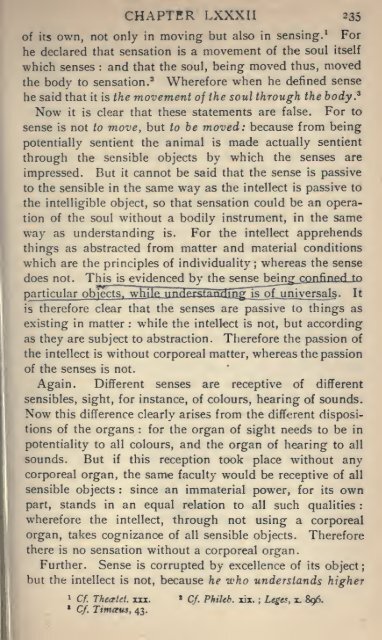summa-contra-gentiles
Summa
Summa
You also want an ePaper? Increase the reach of your titles
YUMPU automatically turns print PDFs into web optimized ePapers that Google loves.
CHAPTER LXXXII 235<br />
of its own, not only in moving but also in sensing.* For<br />
he declared that sensation is<br />
which senses :<br />
a movement of the soul itself<br />
and that the soul, being moved thus, moved<br />
Wherefore when he defined sense<br />
the body to sensation.^<br />
he said that it is the movement of the soul through the body.^<br />
Now it is clear that these statements are false. For to<br />
sense is not to move, but to be moved: because from being<br />
potentially sentient the animal is made actually sentient<br />
through the sensible objects by<br />
which the senses are<br />
impressed. But it cannot be said that the sense is passive<br />
to the sensible in the same way as the intellect is passive to<br />
the intelligible object, so that sensation could be an operation<br />
of the soul without a bodily instrument, in the same<br />
way as understanding is. For the intellect apprehends<br />
things as abstracted from matter and material conditions<br />
whereas the sense<br />
which are the principles of individuality ;<br />
does not. This is evidenced bv the sense heinjy ronfined to<br />
particular objects, while ^lnde^Sfanr^1n^Ms[of jmiyersals . 1 1<br />
is therefore clear that the senses are passive to things as<br />
existing in matter while the intellect : is not, but according<br />
as they are subject to abstraction. Therefore the passion of<br />
the intellect is without corporeal matter, whereas the passion<br />
of the senses is not.<br />
Again. Different senses are receptive of different<br />
sensibles, sight, for instance, of colours, hearing of sounds.<br />
Now this difference clearly arises from the different dispositions<br />
of the organs for the organ of :<br />
sight needs to be in<br />
potentiality to all colours, and the organ of hearing to all<br />
sounds. But if this reception took place without any<br />
corporeal organ, the same faculty would be receptive of all<br />
sensible objects<br />
: since an immaterial power, for its own<br />
part, stands in an equal relation to all such qualities :<br />
wherefore the intellect, through not using a corporeal<br />
organ, takes cognizance of all sensible objects. Therefore<br />
there is no sensation without a corporeal organ.<br />
Further. Sense is<br />
corrupted by excellence of its object;<br />
but the intellect is<br />
not, because he who understands higher<br />
1 Cf. Theatet. xn.<br />
« Cf. Philcb. xix. ; Leges, x. 896.<br />
• Cf. Timceus, 43.


















